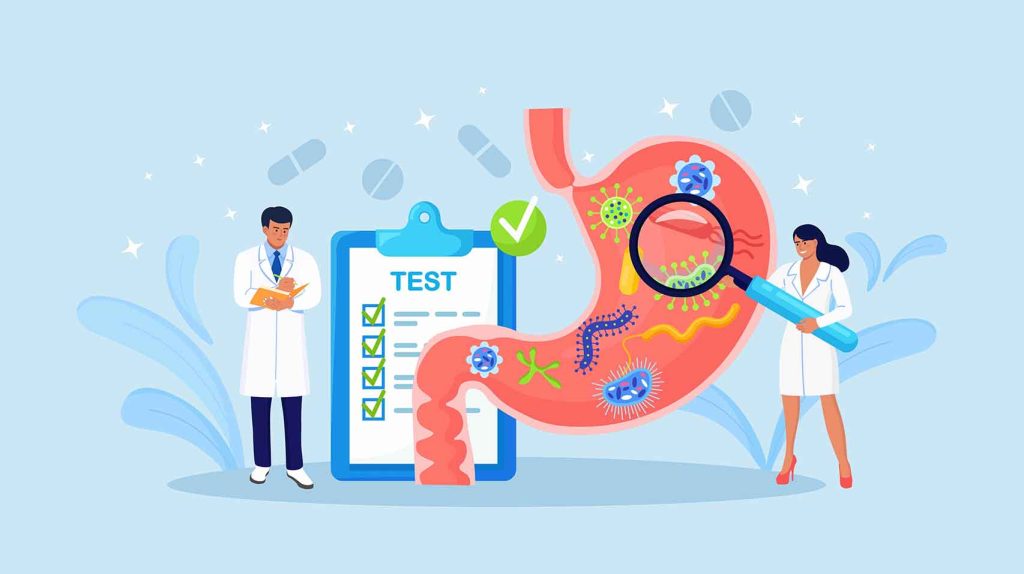In functional medicine and nutritional therapy, gut health is considered the cornerstone of overall well-being. From digestion and nutrient absorption to immune function and even mental health, the gut plays a central role in how we feel each day. However, one often-overlooked disruptor of gut health is alcohol.
While moderate alcohol consumption is widely normalised in our society, its effects on the gastrointestinal system can be underestimated and far-reaching. Alcohol contributes to gut inflammation, microbiome imbalances (dysbiosis), and increased intestinal permeability — factors that can significantly affect digestion, immunity, and systemic health.
In this blog, we explore the effects of alcohol on the gut to help you make more informed choices about your long-term well-being, and provide some useful tips to minimise its impact on your gut health.
Alcohol is a causal factor in more than 200 medical conditions, including high blood pressure, liver scarring, and cancers.
How Alcohol Disrupts Gut Bacteria and Contributes to Dysbiosis
As a functional medicine clinic, we work frequently with clients suffering from gut complaints and conduct a variety of gastrointestinal tests (such as comprehensive stool tests) to better understand the root causes of their symptoms. When analysing the results, one of the most common causes we encounter is dysbiosis — an imbalance between beneficial and harmful gut microbes. Dysbiosis can be caused by many genetic, dietary and lifestyle factors, however, one major contributor to this imbalance is alcohol.
Here’s how alcohol disrupts the gut ecosystem:
-
Reduces beneficial bacteria such as Lactobacillus and Bifidobacterium, which are essential for immune health and gut barrier integrity.
-
Promotes harmful microbes and Candida overgrowth, fuelling inflammation, bloating, and sugar cravings.
-
Slows digestion, creating an environment for small intestinal bacterial overgrowth (SIBO), characterised by gas, bloating, and abdominal discomfort.
-
Increases production of endotoxins, such as lipopolysaccharides (LPS), from Gram-negative bacteria. These toxins can enter the bloodstream when the gut barrier becomes too permeable, triggering systemic inflammation and immune dysfunction.
Beyond digestion, a balanced gut microbiome supports the production of short-chain fatty acids like butyrate (which protects the gut lining), as well as neurotransmitters, bile acids, and vitamins. Alcohol disrupts these functions, weakening the intestinal barrier and promoting chronic inflammation which can have cascading effects that disrupt not only your gut, but other areas of your health too.

Book a Free Discovery Call
Discuss your health concerns with one of our expert practitioners and find out how personalised functional medicine can get your health on the right track.
How Does Alcohol Effect the Gut Barrier and “Leaky Gut?”
The lining of your gastrointestinal tract is made up of a single layer of cells designed to act as a selective barrier—absorbing nutrients while keeping harmful substances out of the bloodstream. When functioning properly, this barrier is held together by tight junctions. However, alcohol has been shown to disrupt these tight junctions, leading to increased intestinal permeability, commonly known as “leaky gut.”
Once the gut lining becomes compromised, toxins, bacteria, and undigested food particles can “leak” into the bloodstream—something the immune system interprets as a threat. This triggers a cascade of immune responses and low-grade systemic inflammation, which can contribute to a range of health issues.
Research shows that even moderate alcohol intake can increase gut permeability, especially when combined with other lifestyle stressors such as a poor diet, high sugar intake, infections, and chronic stress. Over time, this can burden the liver, disrupt immune regulation, and increase the risk of conditions such as:
-
Chronic fatigue and brain fog, due to ongoing inflammation and immune activation
-
Skin conditions like eczema, rosacea, and acne
-
Joint pain and autoimmune conditions, as the immune system becomes dysregulated
-
Food sensitivities, as the immune system begins to overreact to commonly consumed foods
Furthermore, a leaky gut impairs the absorption of critical nutrients such as B vitamins, zinc, magnesium, and amino acids, all of which are essential for detoxification, neurotransmitter production, and tissue repair. Over time, this can contribute to nutrient deficiencies, even in individuals who eat a healthy diet.
How Alcohol Disrupts Digestion: Enzymes, Stomach Acid, and Gut Motility
Beyond its effects on the gut lining and microbiome, alcohol interferes with the body’s ability to digest and absorb nutrients properly. Over time, this can contribute to a range of digestive symptoms and deficiencies.
Here’s how alcohol disrupts digestive function:
-
Reduces digestive enzymes and bile production: Impairs the breakdown and absorption of fats, proteins, and carbohydrates, often leading to bloating, gas, and discomfort.
-
Disrupts stomach acid levels: While small amounts may temporarily increase acid, chronic alcohol use often results in low stomach acid (hypochlorhydria), which hinders digestion and raises infection risk (e.g., H. pylori).
-
Slows gut motility: Alters the natural movement of the digestive tract, contributing to constipation, diarrhoea, or irregular bowel habits—particularly in those with IBS.
-
Damages the mucosal lining: Irritates the oesophagus and stomach lining, increasing the risk of gastritis, ulcers, and acid reflux (GERD).
These effects not only impair digestion but also compromise nutrient absorption, contributing to fatigue, inflammation, and a weakened immune response.
The Inflammatory Effects of Alcohol on Gut and Immune Health
One of the most damaging effects of alcohol on the gut is its ability to trigger chronic, low-grade inflammation—a silent driver behind many long-term health issues. This begins in the gut, where alcohol alters the microbiome and increases intestinal permeability, allowing endotoxins like lipopolysaccharides (LPS) to enter the bloodstream.
Once in circulation, these toxins activate the immune system, keeping it in a constant state of alert. Over time, this persistent immune activation can lead to systemic inflammation, which plays a role in a wide range of chronic diseases.
Key consequences of alcohol-induced inflammation include:
-
Digestive disorders: Chronic inflammation in the gut can lead to conditions such as Irritable Bowel Syndrome (IBS) and Inflammatory Bowel Disease (IBD), often alongside bloating, abdominal pain, and altered bowel habits.
-
Liver damage: The liver plays a central role in detoxifying alcohol and clearing endotoxins. Chronic exposure can lead to fatty liver, alcoholic hepatitis, and eventually cirrhosis, as inflammation causes liver cells to break down over time.
-
Cognitive and mood issues: Inflammation affects the gut-brain axis, contributing to symptoms like brain fog, anxiety, depression, and impaired cognitive performance.
-
Systemic symptoms: Individuals with chronic inflammation may experience joint pain, fatigue, skin flare-ups, or worsening of autoimmune symptoms due to immune system overactivation.
Because the gut is home to over 70% of the immune system, protecting gut health is essential for reducing inflammation and preventing its widespread effects throughout the body. Reducing alcohol intake is a powerful way to lower systemic inflammation and give your gut, liver, and immune system a chance to restore balance and function properly. In functional medicine, this often becomes a critical part of healing protocols for those with inflammatory and autoimmune conditions
Additional Risks of Alcohol on Gut and Systemic Health
The effects of alcohol on the gut don’t stay confined to digestion — they ripple out into many other systems in the body. Because the gut plays a central role in hormone regulation, neurotransmitter production, and immune function, any disruption caused by alcohol can have wide-reaching consequences including:
-
The Gut-Brain Axis and Mental Health: Alcohol disrupts the gut microbiome, which plays a vital role in producing neurotransmitters like serotonin and GABA. This can lead to low mood, anxiety, brain fog, and poor stress resilience.
-
Food Sensitivities and Allergies: Alcohol increases gut permeability, allowing food particles to enter the bloodstream. This may trigger immune reactions, leading to the development or worsening of food intolerances and inflammatory responses.
-
Hormonal Disruption and Metabolic Impact: Alcohol affects hormones that regulate appetite, blood sugar, and reproductive health. It can contribute to insulin resistance, weight gain, and imbalances in oestrogen and testosterone.
-
Increased Cancer Risk: Alcohol metabolism produces acetaldehyde, a known carcinogen that can damage cells and increase the risk of oesophageal, stomach, and colorectal cancers.
-
Candida Overgrowth and Histamine Intolerance: Alcohol feeds Candida albicans, promoting fungal overgrowth. It’s also rich in histamines, which can worsen symptoms like rashes, headaches, bloating, and flushing in sensitive individuals.
These knock-on effects underscore why alcohol reduction is often a core recommendation in functional medicine protocols — especially when addressing chronic symptoms, hormonal imbalances, or autoimmune conditions.

How To Support Your Gut if You Choose to Drink Alcohol: A Functional Medicine Approach
In functional medicine, we understand that health is about balance—not perfection. While the best way to protect your gut is to limit or avoid alcohol altogether, many people still choose to enjoy it occasionally. The good news is that there are targeted steps you can take to minimise its impact on gut health and support your body’s resilience.
Using a functional medicine lens, we focus on three key areas: supporting the microbiome, protecting the gut lining, and enhancing liver detoxification.
1. Nourish Your Gut Microbiome
Alcohol disrupts the balance of beneficial bacteria, so it’s important to actively support microbial diversity:
-
Eat fermented foods rich in probiotics, such as sauerkraut, kimchi, kefir, or coconut yoghurt
-
Include prebiotic fibres from garlic, leeks, onions, asparagus, and green bananas to feed beneficial bacteria
-
Consider a high-quality probiotic supplement if recommended by your practitioner
2. Support Your Gut Lining
To reduce alcohol-related damage and maintain gut barrier integrity:
-
Use L-glutamine, an amino acid that helps repair and regenerate intestinal cells
-
Include bone broth, collagen peptides, or aloe vera juice to soothe and nourish the gut lining
-
Ensure optimal intake of zinc, vitamin A, and omega-3 fatty acids, which play key roles in mucosal healing
3. Enhance Your Liver Detoxification Pathways
The liver is your body’s primary detox organ and works hard to process alcohol. Supporting it helps reduce the burden on your gut and immune system:
-
Take N-acetylcysteine (NAC) and milk thistle to boost glutathione production and phase II liver detoxification
-
Eat cruciferous vegetables (like broccoli, kale, and cauliflower) to enhance detox pathways
-
Stay well hydrated and avoid mixing alcohol with sugary drinks or processed foods, which place additional stress on the liver
4. Practice Mindful Drinking
Try reducing your alcohol intake and be more mindful of when, why and how much you drink alcohol.
-
Choose organic or low-sugar alcohol options, such as dry wines or clear spirits with soda
-
Avoid binge drinking, which causes the greatest harm to the gut-liver axis
-
Have alcohol with food to slow absorption and reduce its impact on blood sugar and gut lining
Even small steps can make a meaningful difference. A functional medicine approach empowers you to build resilience from the inside out, supporting your gut even when life calls for the occasional drink. If you regularly experience digestive symptoms, fatigue, or inflammation, it may be worth investigating your gut and liver function through functional testing.
For more information on our range of health tests, personalised nutrition and lifestyle plans and targeted supplement protocols tailored to your needs by our practitioners visit our How It Works page.

Book a Free Discovery Call
Schedule a consultation with our functional medicine expert to uncover the root cause of your symptoms and receive a tailored treatment plan.
YOUR HEALTH. YOUR CHOICE.
Your gut is more than just a digestive organ — it’s a foundation for your immune system, mental health, and metabolic function. Reducing or eliminating alcohol can have a powerful impact on your digestive health, helping to rebalance your microbiome, restore gut barrier integrity, and reduce systemic inflammation.
At Nutrition Diets Clinic, our functional medicine approach goes far beyond generic advice by considering your unique genetic makeup, diet, environmental exposures, lifestyle factors, and health history to get to the root cause of your health concerns.
1) Expert one-to-one therapy
2) Personalised nutrition and lifestyle plans
3) Easy, at-home functional testing
Starting the journey towards improved health can feel daunting but our team of qualified professionals are here to provide you with expert guidance and support every step of the way.
We offer thorough clinical assessment and therapy via convenient online consultations. Getting started is simple and free. Take charge of your health today with our evidence-based strategies.
